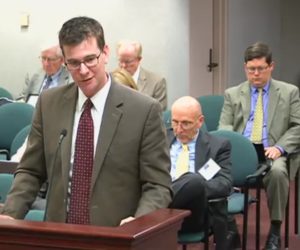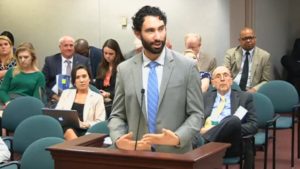Representatives of four high-profile charter school networks told a Florida House committee they are eyeing the state for future expansions. They also discussed the barriers that might keep them away.
When it comes to attracting top charter school operators, the Sunshine State has a lot going for it.
It's the third-largest state. Its population is growing — so much so that some districts are rolling out the welcome mat to charters that might help exert growth. Its 20-year-old charter school law is ninth-best in the nation, according to the National Alliance for Public Charter Schools. It has more than 650 charter schools and thriving school choice culture. But since charters enroll one in ten of its 2.8 million public school students, it isn't totally saturated.

Peter Bezanson, of BASIS charter schools, testifies before the Florida House Choice and Innovation Subcommittee.
And yet, the state has struggled to attract the kind operators that appeared before the House Choice and Innovation Subcommittee this week — organizations that draw national headlines for targeting the most disadvantaged students and pushing them toward college.
Each of the charter groups cited potential obstacles that, in one form or another, are on lawmakers' radar during the upcoming legislative session: Teacher certification rules, school facilities, equitable funding.
BASIS runs academically "hyper-accelerated" charter schools in Arizona, Texas and Washington. Its schools push ninth-graders to take precalculus and require their students to take at least six Advanced Placement exams. It's created elementary schools and extended school days to make its demanding academics accessible to low-income students.
CEO Peter Bezanson said Florida is one of the top four states where BASIS eyeing future growth.
"We wanted to be a great choice, a high-quality choice for every kid who is willing to work hard," he said.
BASIS schools like to hire "subject-expert teachers," Bezanson said. If teachers are well-trained in a subject like physics and have an ability to connect with students, he said, certification exams and other regulations become needlessly onerous.
Existing Florida law comes close to providing the freedom BASIS needs, he said. Schools can hire recent physics majors, for example. They can receive "probationary" teaching certificates, and navigate one of Florida's several alternative certification systems while they work in the classroom. Some influential state lawmakers want to open up teacher certification even more. And recent studies lend credence to their thinking.
"BASIS needs the freedom to hire just like any private school has the freedom to hire," Bezanson said.
IDEA Public Schools, which were founded in South Texas and recently won the coveted Broad Prize for charter schools, also want greater freedom from teacher certification requirements. Daniel Fishman, the organization's vice president for growth, said it recruits educators in communities where it opens schools, but might want to bring them to established schools in Texas to hone their craft on the job.
In other words, he said, teacher certification regulations need to be light-touch enough to allow teachers to move seamlessly between states.
Fishman said IDEA schools need access to facilities — or reliable funding to pay for facilities — and equitable funding compared to what districts receive. Other operators echoed that point, saying they rely on philanthropy for startup costs, but need to become financially sustainable in the long run.

Danile Fishman, VP of growth at IDEA Public Schools, testifies before the Florida House Choice and Innovation Committee.
A pair of bills filed in the state Senate, set to get their first hearing next week, would steer more capital funding to charter schools. A separate Senate bill includes changes designed to make funding closer to equal for "high-impact" charter schools that can prove they serve disadvantaged students and get strong academic results. Both proposals could make Florida more attractive to charter operators with a national profile.
Peter Cymrot, a senior counsel for Achievement First, said the network is also looking for locales where low-performing charter schools are held accountable. Allowing "bad operators" to remain in operation can harm the stronger charter schools. Florida, he said, is "a place that we're very interested in pursuing growth, if we can find conditions that work here."
For Lesley Poole, CEO of the SEED Foundation, the constraints on growth look a little different. Her organization operates the state's only public charter boarding school in Miami, as part of a state pilot program that provides extra funding for the round-the-clock support it provides students. If it had similar support to start more schools, she said, the organization would be willing and able to open new schools in Florida.
"If you tell us to, we will," she said. "If you make it happen, we will follow your lead."
Richard Corcoran, Florida's Speaker of the House, has hinted at funding changes that would allow SEED-like schools to sprout in other parts of the state without relying on one-off appropriations from the Legislature.
Details of that plan have yet to emerge, but it's clear lawmakers intend to roll out the welcome mat for top charter schools with national reputations.